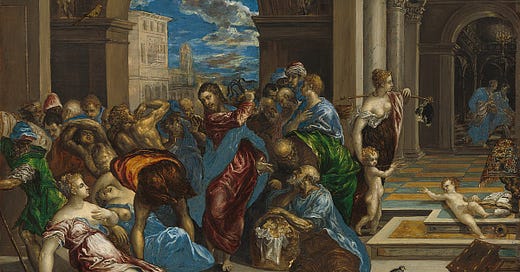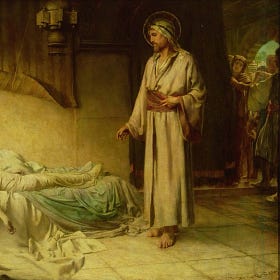Today’s Gospel uses the intercalation story structure, which I wrote about in one of my earliest posts:
Waiting on a Miracle
Today, we’ve got a Gospel that’s pretty obviously near to my heart, but I bet a lot of people can identify.
Speaking of miracles, a Spanish family prayed a novena for a cure for the father’s debilitating disease. Through the intercession of Venerable Isidoro Zorzano, God granted this miracle, and now Zorzano is on his way to being canonized an official saint. You can read about it in Aleteia.
And speaking of novenas, the Novena to the Sacred Heart of Jesus starts June 7.
Reading 1
Sir 44:1, 9-13
Now will I praise those godly men, our ancestors, each in his own time. But of others there is no memory, for when they ceased, they ceased. And they are as though they had not lived, they and their children after them. Yet these also were godly men whose virtues have not been forgotten; Their wealth remains in their families, their heritage with their descendants; Through God’s covenant with them their family endures, their posterity, for their sake.
And for all time their progeny will endure, their glory will never be blotted out.
Ben Sira is about to recount a history of Israel to his son, but first, he wants to talk about all the Godly people whose names we’ll never know. Their posterity is virtue, the values they passed down to their children.
We don’t know their names, but we know who they were. They were great, they were good; they had to be, or their descendants wouldn’t have the society they live in to this day.
Responsorial Psalm
PS 149:1b-2, 3-4, 5-6a and 9b
R. The Lord takes delight in his people.
Sing to the LORD a new song
of praise in the assembly of the faithful.
Let Israel be glad in their maker,
let the children of Zion rejoice in their king.
R. The Lord takes delight in his people.
Let them praise his name in the festive dance,
let them sing praise to him with timbrel and harp.
For the LORD loves his people,
and he adorns the lowly with victory.
R. The Lord takes delight in his people.
Let the faithful exult in glory;
let them sing for joy upon their couches;
Let the high praises of God be in their throats.
This is the glory of all his faithful. Alleluia.
R. The Lord takes delight in his people.
This is a hymn calling people to celebrate God as one community. Not just the band, but everyone should join in, even if you’re sitting on the couch.
As Christians, we believe “all the faithful” is more than just the people living on Earth, but those in Heaven, as well. And how did so many people get there? Probably in part because they were raised right, by those nameless mentioned in Sirach.
Alleluia
See Jn 15:16
R. Alleluia, alleluia.
I chose you from the world,
to go and bear fruit that will last, says the Lord.
R. Alleluia, alleluia.
Just in case it’s unclear, Jesus isn’t expecting you to become a fruit farmer.
Gospel
Mk 11:11-26
Jesus entered Jerusalem and went into the temple area. He looked around at everything and, since it was already late, went out to Bethany with the Twelve.
The next day as they were leaving Bethany he was hungry. Seeing from a distance a fig tree in leaf, he went over to see if he could find anything on it. When he reached it he found nothing but leaves; it was not the time for figs. And he said to it in reply, “May no one ever eat of your fruit again!” And his disciples heard it.
They came to Jerusalem, and on entering the temple area he began to drive out those selling and buying there. He overturned the tables of the money changers and the seats of those who were selling doves. He did not permit anyone to carry anything through the temple area. Then he taught them saying, “Is it not written: My house shall be called a house of prayer for all peoples? But you have made it a den of thieves.”
The chief priests and the scribes came to hear of it and were seeking a way to put him to death, yet they feared him because the whole crowd was astonished at his teaching. When evening came, they went out of the city.
Early in the morning, as they were walking along, they saw the fig tree withered to its roots. Peter remembered and said to him, “Rabbi, look! The fig tree that you cursed has withered.”
Jesus said to them in reply, “Have faith in God. Amen, I say to you, whoever says to this mountain, ‘Be lifted up and thrown into the sea,’ and does not doubt in his heart but believes that what he says will happen, it shall be done for him. Therefore I tell you, all that you ask for in prayer, believe that you will receive it and it shall be yours. When you stand to pray, forgive anyone against whom you have a grievance, so that your heavenly Father may in turn forgive you your transgressions.”
The fig tree story has confused many casual Bible fans,1 but the context makes it a little more clear.
You see, Jesus doesn’t curse the tree so that it becomes barren; He found it barren. Then He curses it, because it hadn’t borne fruit.
Next, He goes to the temple, finds the money changers, and kicks them out. Jesus spends the day preaching, but the priests and scribes aren’t listening. They’re too busy plotting.
The next day, when Jesus and the Apostles go back the way they came, they find the fig tree has withered. But that’s just the outward sign; it was already rotted. If it wasn’t, it would have produced fruit. The good things grow from the inside out.
This ties back into the first reading, where we don’t have any outward recognition of the Godly men history has forgotten. But we do have their fruit: their children and their society.
The scribes and priests aren’t bearing fruit. They’re going to end up withered and dead, too, not because of an arbitrary curse, but because they called the curse upon themselves.
Jesus’ words produce their own (metaphorical) fruit. His curse has a solid, concrete result. He tells the Apostles (and by extension, us) that with faith, prayer can have very real effects.
The first, most important thing he tells us to pray for? Forgiveness, of others and ourselves. So if you are planning on praying the Novena to the Sacred Heart of Jesus, that would be a good place to start..







